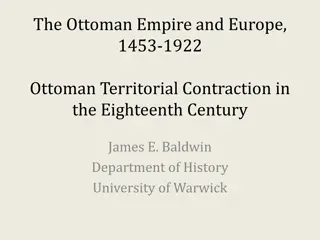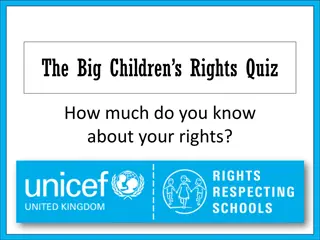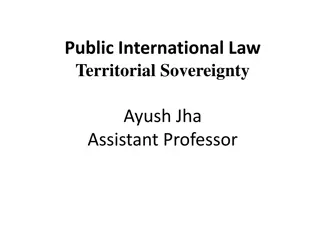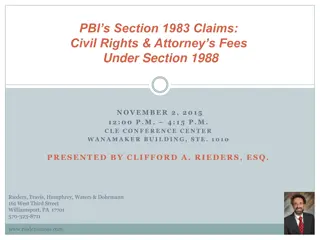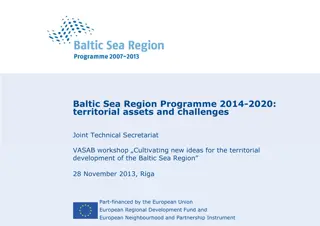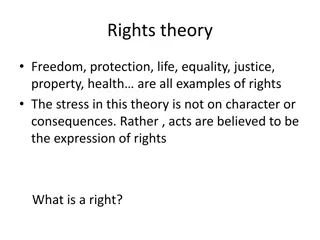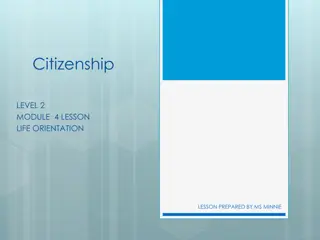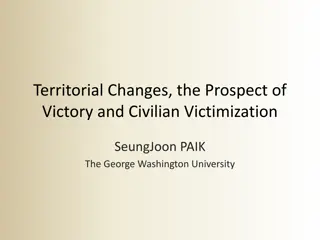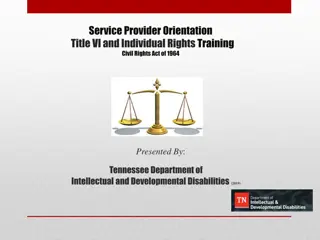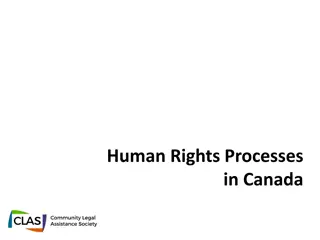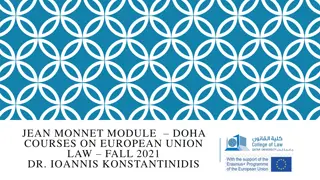Approaches to the study of Human Rights
The Marxist perspective on human rights emphasizes social rights over individual rights, viewing the full realization of self within society. Marx connects bourgeois society with human rights, highlighting how exploitation under capitalism alienates individuals. In contrast, the Third World perspect
5 views • 19 slides
Promoting Children's Rights in Education for Scotland's Learners
Raise awareness about Children's Rights, the United Nations Convention on the Rights of the Child, and how to embed them in education. Explore the importance of developing a culture that upholds rights-based practices and supports children in claiming their rights. Reflect on professional standards
1 views • 26 slides
Ottoman Empire Territorial Contraction in the 18th Century
Ottoman Empire faced agricultural and fiscal crises in the 17th century, leading to internal rebellions. However, by the mid-17th century, the empire had recovered and experienced further expansion, albeit at a slower rate compared to the previous century. In the 18th century, the Ottomans suffered
2 views • 12 slides
Understanding Human Rights: Overview and Evolution
Human rights encompass various aspects such as human needs, generations of rights, individual status, and the indivisibility of rights. Dr. Anna Ledzi ska-Simon discusses the translation of human needs into rights, the historical evolution of rights across generations, individual rights according to
3 views • 17 slides
Understanding Human Rights in Queensland Government Work
The Human Rights Act of 2019 in Queensland outlines protected rights such as equality, freedom of expression, and fair trial. All public service employees must adhere to these rights, ensuring decisions and actions respect human rights. This act applies to everyone in the Queensland Government, with
2 views • 13 slides
Understanding the Basic Concept of Human Rights in Modern Jurisprudence
Human rights are natural and inalienable, essential for human life, based on universal principles. The concept of human rights is both simple and complex, requiring societal development and political will for implementation. Rooted in natural law theory, human rights have evolved from natural law to
1 views • 24 slides
Test Your Knowledge: The Big Children's Rights Quiz
Test your knowledge of children's rights with "The Big Children's Rights Quiz." The quiz includes true or false questions related to the United Nations Convention on the Rights of the Child, government responsibilities, the importance of rights, and the concept of Duty Bearers. Explore these thought
0 views • 24 slides
Rise of Janapadas and Mahajanapadas in Vedic India
The rise of Janapadas and Mahajanapadas marked a significant transition in the political landscape of Vedic India. Janapadas, major kingdoms of that era, evolved into more powerful Mahajanapadas through territorial expansion and urbanization. The shift from tribal polities to territorial states led
0 views • 9 slides
Legal Rights and Options for Regional Center Clients in California
This document discusses the legal rights and options available for adult regional center clients in California, focusing on clarifying their rights, reviewing support systems, exploring alternatives to conservatorship, and explaining the conservatorship process. It also covers children's and adults'
1 views • 35 slides
Reflection on Human Rights and Criminals
Explore the complex question of whether criminals should have human rights, delving into the distinctions between absolute and non-absolute rights, and the impact of child labor on human rights. Consider the removal of certain rights from criminals and engage in critical thinking exercises regarding
1 views • 19 slides
Civil Rights Training Overview for SMP Participants
This civil rights training presentation covers the goals of civil rights, discrimination, protected classes, examples of discrimination, components of civil rights compliance, and the importance of equal access for all participants in the SMP program. It emphasizes equal treatment, knowledge of righ
0 views • 36 slides
Understanding Territorial Sovereignty in Public International Law
Territorial sovereignty is a fundamental concept in Public International Law, essential for understanding the exercise of state authority within a defined territory. This concept encompasses the legal aspects of sovereignty, jurisdiction, and the rules governing territorial ownership changes. The ac
1 views • 12 slides
Challenges and Progress in 1920s American Civil Rights Movement
The 1920s in America saw significant changes in civil rights, women's movement, and prohibition. Civil rights encompass personal freedoms guaranteed by the U.S. Constitution, including freedom of speech, voting rights, and protection from discrimination. Violations of civil rights have occurred thro
1 views • 42 slides
Understanding Section 1983 Claims and Civil Rights Attorney Fees
Section 1983 of the Civil Rights Act allows individuals to seek redress for violations of their constitutional rights by persons acting under state law. This provision does not create new rights but provides remedies for existing rights. The history of Section 1983 dates back to 1871 and has been in
0 views • 27 slides
Management Plan for Queen Conch Fishery in St. Croix, USVI
Regulatory Amendment 2 aims to establish coherent regulations for the commercial and recreational harvest of queen conch in the U.S. Caribbean exclusive economic zone and USVI territorial waters. The proposal addresses the compatibility of commercial trip limits and recreational bag limits to enhanc
0 views • 7 slides
Liberal Democracy and Citizenship: Rights, Duties, and Participation
Citizenship in liberal democracies entails equal rights, duties, liberties, and constraints, with a focus on civil and political rights. The entrenchment of these rights has been key in establishing popular sovereignty and individual autonomy. Civil rights, developed in the 18th century, centered on
2 views • 16 slides
European Territorial Cooperation: Regulatory Framework and Key Features
This content delves into the European Territorial Cooperation (ETC) regulatory framework, covering key regulations, the context of proposals, and the key features of ETC regulation. It discusses the scope of ETC regulation, components of the European territorial cooperation goal, and the relationshi
0 views • 15 slides
Evolution of Human Rights: From Ancient Times to Modern Era
Throughout history, ideas of rights and liberty have evolved, leading to the recognition of universal human rights in the modern sense. The concept of human rights can be traced back to significant historical events such as the English Bill of Rights, the Virginia Declaration of 1776, and the French
0 views • 7 slides
Understanding Citizenship and Immigration in Modern Democracies
Citizenship, a fundamental institution of modern democracies, defines the relationship between individuals and the state through reciprocal rights and duties. However, citizenship has a dual nature, serving to both include certain individuals as citizens and exclude others. Immigrants residing withi
0 views • 21 slides
Overview of the Army Cadet League of Canada
The Army Cadet League of Canada is a civilian nonprofit organization that works in partnership with local communities and the Canadian Armed Forces to support Army Cadets. It follows a federated model with 13 provincial and territorial branches, and relies heavily on volunteers for its workforce. Su
0 views • 11 slides
Human Rights and Citizenship Rights in Leisure, Sport, and Tourism: A Historical Perspective
This text delves into the intersection of human rights, citizenship rights, and leisure activities like sports and tourism. It explores the definitions, history, and declarations related to human rights, emphasizing the importance of allowing individuals the freedom to pursue leisure activities with
0 views • 20 slides
Understanding Residents Rights in Nursing Homes
Residents of nursing homes have additional rights beyond their rights as U.S. citizens. These rights, protected by federal law, ensure that residents are treated with dignity, have self-determination, make choices, receive information, and have access to communication and services. Exercising these
0 views • 40 slides
Overview of International Human Rights Law and Treaties
This comprehensive overview delves into the foundations of international human rights law, exploring key documents such as the Universal Declaration of Human Rights, the International Bill of Rights, and various human rights treaties addressing discrimination, women's rights, children's rights, migr
1 views • 27 slides
Territorial Development in the Baltic Sea Region Programme 2014-2020
The Baltic Sea Region Programme 2014-2020 focuses on sustainable regional development through transnational cooperation projects, addressing territorial challenges, and fostering place-based growth. It covers 11 participating countries and aligns with the EU Strategy for the Baltic Sea Region, provi
1 views • 11 slides
Integrated Territorial Development in Europe 2021-2027
Programming Policy Objective 5 (PO5), led by Wallis Goelen, focuses on integrated territorial development in Europe for the period 2021-2027. PO5 aims to address diverse local needs through methods like CLLD and ITI, fostering sustainability in urban and rural areas. Integrated Territorial Developme
0 views • 15 slides
Understanding Rights Theory and its Significance in Society
Rights theory emphasizes the importance of fundamental rights such as freedom, protection, life, equality, justice, property, and health. It traces back to contract theories of politics and delves into the concept of natural and conventional rights, both positive and negative. The theory posits that
0 views • 5 slides
Evolution of Human Rights Protection in the EU
The journey of human rights protection in the EU, from the absence of explicit rules to the affirmation of fundamental rights by the CJEU, influenced by case law and the evolution from judicial to codified protection. National courts' concerns on ensuring consistency with constitutional values led t
0 views • 9 slides
Environmental Territorial Management for Water and Energy Security
Environmental territorial management plays a crucial role in boosting water and energy security. The approach focuses on the Parana River basin, encompassing numerous reservoirs and dams, highlighting challenges to water security such as ecosystem services loss and increased loads in water bodies. I
0 views • 10 slides
Veneto Region Territorial Cooperation and Macroregional Strategies Unit Overview
The Veneto Region in Italy is actively involved in European Territorial Cooperation (ETC) Programs, focusing on the MED Programme. The region's internal organization, led by the Territorial Cooperation and Macroregional Strategies Unit, is dedicated to setting policies, providing human resources for
0 views • 11 slides
Overview of the African Commission on Human and Peoples' Rights
The African Commission on Human and Peoples' Rights was established to promote and protect human rights across Africa. The African Charter, which entered into force in 1986, emphasizes civil and political rights, including freedom from discrimination, equality, life, personal integrity, and various
0 views • 27 slides
The Significance of Human Rights in the Modern World
Human rights are fundamental rights that belong to all individuals, are inalienable, indivisible, interconnected, and should be respected without prejudice. The Universal Declaration of Human Rights, adopted in 1948 after WWII by the United Nations, is a crucial milestone document emphasizing human
1 views • 5 slides
Influential Forces and Outcome of the Paris Peace Conference & Treaty of Versailles
Representatives of major nations convened at the Paris Peace Conference in 1919 to discuss the post-World War I peace process. The Big Four, comprising Great Britain, France, the United States, and Italy, had significant influences in shaping the Treaty of Versailles. The demands of the Big Four var
0 views • 7 slides
Enhancing Transparency in Human Rights Performance Measurement
This information focuses on initiatives like the Human Rights Measurement Initiative (HRMI) that aim to provide new data for researching and advocating human rights issues globally. The HRMI project, founded in 2015, collaborates with various stakeholders and is funded by philanthropic grants. It em
1 views • 19 slides
The Bill of Rights: Summary of Constitution Amendments
The Bill of Rights comprises the first ten amendments to the United States Constitution. These amendments guarantee various fundamental rights and protections to American citizens. Amendment I protects religious freedoms, free speech, and the right to assemble. Amendment II safeguards the right to b
0 views • 11 slides
Understanding Citizenship Rights in South Africa
South Africa's Constitution guarantees various rights and freedoms to all citizens, ensuring equality, dignity, and protection. The Bill of Rights enshrines over 25 fundamental rights, emphasizing equality before the law and prohibiting unfair discrimination based on various grounds. The Constitutio
0 views • 49 slides
Analysis of Civilian Victimization in the Korean War: Territorial Changes and the Prospect of Victory
This research presentation delves into the civilian victimization during the Korean War, exploring the impact of territorial changes and the prospect of victory. It examines the research question on why participants in conventional civil wars target civilians and what factors determine the violence
0 views • 13 slides
Understanding Human and Civil Rights in DIDD Services
Protecting the rights of individuals receiving Department of Intellectual and Developmental Disabilities (DIDD) services is essential. This training covers Title VI and individual rights under the Civil Rights Act of 1964, emphasizing equality and access to programs regardless of race, color, sex, d
1 views • 31 slides
Understanding Human Rights: Module 1 Overview
This module serves as an introduction to human rights principles, instruments, and monitoring mechanisms. It covers the definition of human rights, the Universal Declaration on Human Rights, key principles, and state obligations. Human rights are universal legal guarantees that protect individuals a
0 views • 21 slides
Human Rights Processes in Canada: Legislation and Protections Explained
Understand the human rights processes in Canada, including the two general sources of human rights, human rights legislation, federal vs. provincial/territorial laws, and the specifics of the BC Human Rights Code. Learn about direct and indirect discrimination, duty to accommodate, and the areas pro
1 views • 12 slides
EU Charter of Fundamental Rights and European Convention on Human Rights Overview
The course module on European Union Law in Doha focuses on the EU Charter of Fundamental Rights and its relationship with the European Convention on Human Rights. It covers topics such as the EU's accession to the Convention, external action on human rights, and the differences between the Charter a
0 views • 26 slides


